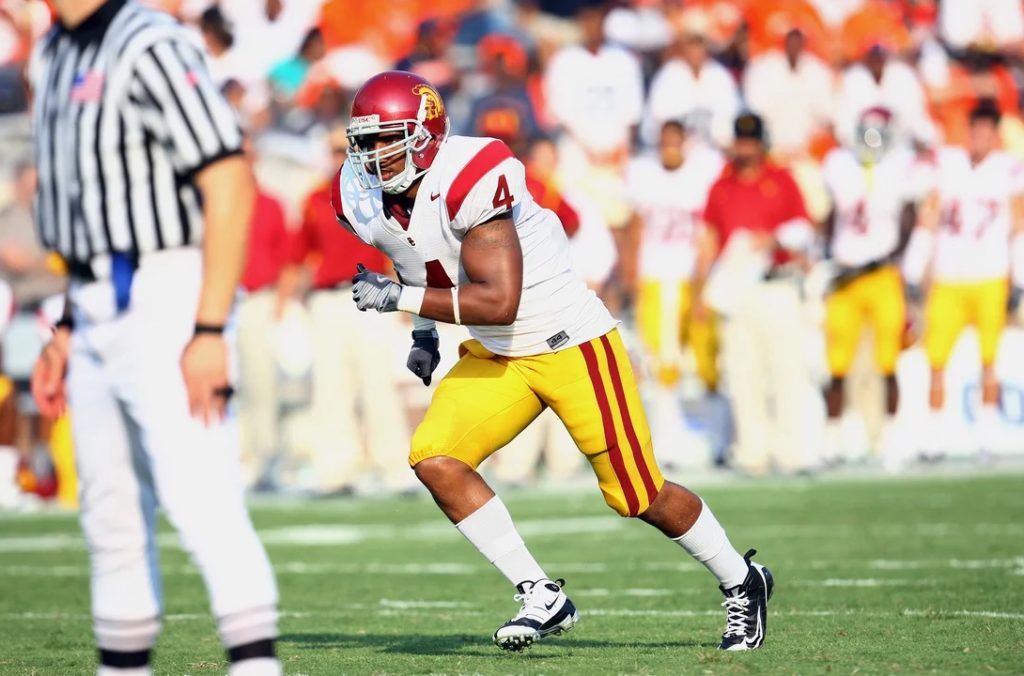News
CTE questions surround former USC player’s death
Kevin Ellison was the captain of the University of Southern California football team, an all-Pac-12 safety, and three-time Rose Bowl winner. For a short time, he was also a member of the San Diego Chargers.
This week, Kevin Ellison died walking along a San Fernando Valley freeway. The USC Trojans Twitter account announced the news Saturday evening.
The details of his death are unclear, though it seems likely the 31-year-old was struck by a vehicle along the freeway. What is clear is that Ellison had been struggling with mental health issues for years, which his family believes are the result of chronic traumatic encephalopathy.
“He was disoriented and didn’t know where he was at,” Kevin’s brother, Chris, told the L.A. Times. “I’m sure he was trying to come home and find his family. We love him so much… My mom and sister and dad and brother did everything they could.”
After his exit from the NFL, Ellison has publicly struggled with mental health issues which have landed him in court. In one such incident from 2012, Ellison was charged with federal arson after setting his bed on fire at a Washington lodge. The fire caused over $50,000 in damages, according to the Times.
At the time, Ellison said that “God told him to set the fire.”
Since then, Ellison has largely remained out of the headlines, but his family says the issues continued to progress. They were already planning to donate his brain to the Boston University brain bank for CTE research before the incident which took his life.
CTE has been found in more than a hundred former professional football players, as well as several college-level players after their deaths. The condition is also tied to severe memory problems, behavioral issues, and mental health problems. There is also growing evidence CTE may make it more likely for individuals to commit crimes such as Ellison’s arson incident due to the combination of anger control issues and cognitive difficulties.
Unfortunately, despite progress in establishing diagnostic methods for living individuals, CTE can still only be definitively diagnosed in post-mortem autopsies. All signs point indicate Ellison may have been living with CTE for years, though his condition won’t be known for sure until his brain is able to be examined by researchers.
In the wake of Ellison’s passing, love and support have come from USC alumni and football fans.
Can recall my first week at USC as an assistant on staff. Kevin Ellison was one of the first players to say hello. His grace became a trademark among his teammates, along with his incredible passion/intellect for the game. Much love to his family & friends. Gone too soon. ❤️🙏🏼
— Yogi Roth (@YogiRoth) October 7, 2018
“Kevin Ellison was one of the first players to say hello,” wrote Yogi Roth, a former assistant coach for USC from 2005-2009. “His grace became a trademark among his teammates, along with his incredible passion/intellect for the game. Much love to his family & friends. Gone too soon.”
No words accurately describe the loss of Kevin Ellison.
A great leader and far and away the most under-appreciated Trojan of my lifetime —Taylor Mays isn’t a three-time All-American without him— which made his pro & off-field struggles sad enough. This? Numbing.
— Michael Castillo (@MichaelCastFS) October 7, 2018
“No words accurately describe the loss of Kevin Ellison,” tweeted Michael Castillo, the head behind the Reign of Troy podcast, which focuses on USC football coverage. “A great leader and far and away the most under-appreciated Trojan of my lifetime.” Castillo has also written about the conflicting knowledge that “that part of what made him such a good football player —his aggressive, hard-hitting style— could have played a role in taking him too soon.”
https://www.instagram.com/p/BonQ3I7hg-SkyCqFE7ZU158b5Nyk6amrOi76yo0/
Former high school teammate and close friend Stephon Sudduth also shared a heartfelt tribute on Instagram describing Ellison as “a mentor and a friend.”
“When I first started playing football, this man told me I would be something special one day,” wrote Sudduth. “Not only did he teach me how to play the sport in the same physical way that he did but to also be a student of the game.”
“I hope now that he’s watching me with Coach Eddy and Coach Jasp knowing that I’m working as hard as I can in everything I do,” he continued. “One day, I’ll be in the mentor role and I hope to instill the same principles that he taught me when I first started playing.”




